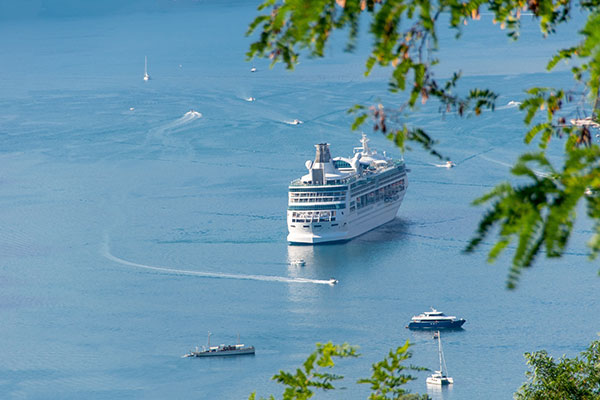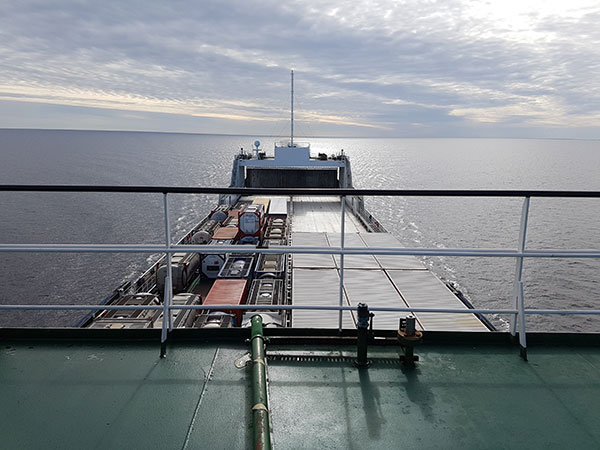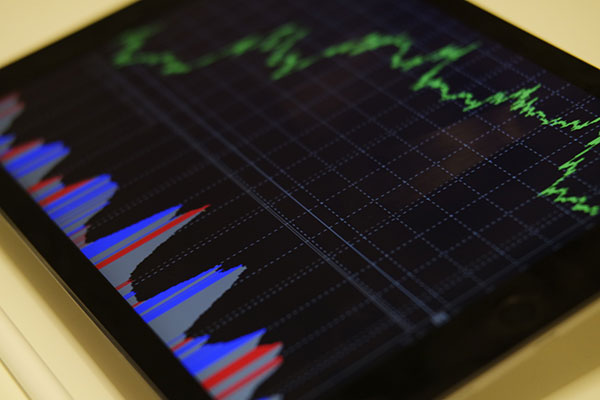Ports
Systems
When data hits the waves
Onboard data can provide energy efficiency edge for ships – starting with reducing fuel emissions

photo: PIXABAY
The research project Data Analytics for Zero Emission Marine (DAZE) will explore the use of data to significantly reduce emissions from shipping. The three-year project will start in September 2023.
Globally, there is great potential for
significant reduction of energy used
in shipping. This is achieved by utilizing
actions such as speed reduction, improved
port operations, propulsion, and ship internal
energy optimization.
The project is run by Åbo Akademi
University, located in Turku, Finland.
Jerker Björkqvist, PhD, Associate Professor,
Department of Information Technologies
from Åbo Akademi University, serves
as the coordinator for the DAZE project.
He says that data analytics can be a big
game-changer for energy savings upon
the seas.

Jerker Björkqvist, PhD, Associate Professor,
Department of Information Technologies
from Åbo Akademi University says that
data can, for sure, be the ‘new oil’ in the
sense that it makes operations smoother
– for example, optimizing operations and
reducing unnecessary operation delays due
to unplanned maintenance.
Photo: ÅBO AKADEMI UNIVERSITY
“Research data says that data analytics
has the potential of achieving fuel
savings of 10–50%. However, the high
end savings can only be reached if speed
reduction is utilized, which is not always
an option,” says Björkqvist.

photo: PEXELS
GET MORE OUT OF YOUR DATA
The often-repeated phrase “data is the
new oil” suggests that we live in a new
data economy where deft controlling and
processing of data can be the difference
between success and failure. But just like
crude oil, data is only valuable if it is properly
refined: data must broken down and
analyzed for it to have significant value.
Björkqvist is onboard with the comparison:
“Data can, for sure, be the ‘new
oil’ in the sense that it makes operations
smoother – for example, optimizing operations
and reducing unnecessary operation
delays due to unplanned maintenance,”
he says.
In the DAZE project, on-ship data will
be used to analyze the energy efficiency
of operational vessels by utilizing energy
models of ship components and providing
the tools to perform real-time energy
optimization. Data will also be utilized for
model-based component monitoring, enabling performance optimization and diagnostics
features. The project will develop
the computing architecture for performing
novel integrated on-ship computing,
supported by cloud computing services.
THE HYBRID WAY
The energy analysis will be used for analyzing
and retrofitting new propulsion
upgrades and to give insights into how
the hybridization of vessels can improve
performance. Electrification and the introduction
of fossil-free synthetic fuels like ammonia and methanol require next-level
vessel energy efficiency to provide competitive
vessels for shipping companies.
“We’re expecting DAZE to deliver
concepts for gathering and analyzing data
from a vessel, with the help of which decisions
can be automatically taken to optimize
energy consumption and reduce
emissions,” says Kenneth Widell, Senior
Project Manager at Wärtsilä leading the
Zero Emission Marine Program.
“The data modelling is expected
to predict the most economical path to reduce emissions according to the desired
reduction targets,” adds Widell.

photo: PEXELS
BUILDING ON TRADITION
Jerker Björkqvist comments that it is very
rewarding for Åbo Akademi University
to contribute to the next generation of
shipping, where energy efficiency and zero
emissions are a high priority.
“Our long experience of cooperation
with the shipping cluster along the Finnish
west coast is further strengthened through
this project. At the same time, we get to
cooperate with technical universities, both
in Finland and the Nordic countries, with
regards to technology that aims for zero
emissions,“ Björkqvist says.
According to Björkqvist, the most
challenging part of the research project is
to achieve a high-precision virtual thrust
sensor.
“This is where data would provide
information on what actual, momentary
thrust is provided by the propulsion system.
Generally speaking, the combination
of data-driven and model-driven methods for energy optimization and diagnostics is
a broad way of achieving improved value
from data,” he says.
SECURE COMPETITIVE EDGE
“The big expectation for the project is to
provide research that can “significantly
improve” the competitiveness for the maritime
sector,” says Björkqvist.
“We can accomplish this by providing
the necessary background knowledge
to produce new products and services, utilizing
data at a new level.”
Björkqvist believes that Finnish
marine is in a great position to make a
big leap in data analytics. “Finland has
a strong legacy in building wireless networks,
as well as connected services for
those networks, including Edge computing.
This gives an advantage for implementing
and operating data collection,
management and analytics systems in
remote locations like ships,” he says.
“For the marine sector, the strong
competence in computer-aided engineering
makes it possible to use that knowledge to get a much better understanding
of what the data means and how to
use it.”
BROAD SHOULDERS
The research project DAZE is funded by
Business Finland and the project partners
are, in addition to Åbo Akademi University,
Tampere University, University of
Vaasa, University of Oulu, Aalto University,
Wärtsilä, Wasaline, Wapice, SiloAI., Nextfour
and Meriaura.
The DAZE project is directly linked
to the Business Finland Veturi ecosystem
‘Zero Emission Marine’ (ZEM) program lead
by Wärtsilä (2022–2025).
The work is deemed important since estimates show that
about 90% of data generated onboard the ship never leaves the
deck. This means operators are losing out on valuable insight
and analytics that can improve performance. However, if one
manages to get all that data into the right hands, it becomes
viable to not only boost efficiency and cut down CO2 emissions
– it will take the industry a lot closer to creating a cohesive, connected
marine ecosystem that is smart, sustainable and safe.
by: Sami J. Anteroinen
Blue carbon showed the way
Leveraging data to bring marine
emissions down has been a hot
topic for a while now. For example,
in 2020, Wärtsilä’s Blue Carbon Project
won first place in United Nations’
AIS Big Data Hackathon. The winning
idea revolved around providing a comprehensive
picture of the true state of
maritime emissions.
In the Hackathon, the Wärtsilä
team created a global map to upgrade
the reporting accuracy for ship emissions
by breaking them down geographically.
The map can aid regulatory
development for shipping, and
also help research institutions to attain
greater accuracy in their measurements
by using this data to eliminate
emissions generated by ships.
The team recognized that
reduced fuel consumption equals
reduced emissions – which is a winwin
solution for both businesses and
the planet. This is not exactly news:
also IMO’s Ship Energy Efficiency Management
Plan (SEEMP) guidelines list a
variety of options to improve fuel efficiency
– from speed optimization and
optimized weather routing to timely
hull maintenance and engine load efficiency.
However, Wärtsilä has a Fleet
Operations Solution (FOS) that is
targeting these very areas very diligently.
In practice, this means realtime
weather forecasts, auto-optimized
speed and routes that give the
best fuel efficiency while ensuring voyage
safety. The solution also supports
predictive maintenance for propeller,
hull and engine condition to ensure
that vessel performance is optimal at
all times.
by: Sami J. Anteroinen
ZERO EMISSION MARINE 2030
- four-year ecosystem project led by Wärtsilä
– the goal is to reach 60% greenhouse gas (GHG)
reduction in maritime by 2030
– also, all the Wärtsilä Veturi ecosystem products will be
carbon-neutral or carbon-negative by 2050
– brings together e.g. fuel manufacturers, energy
producers, shipping companies, logistics providers,
research organizations



